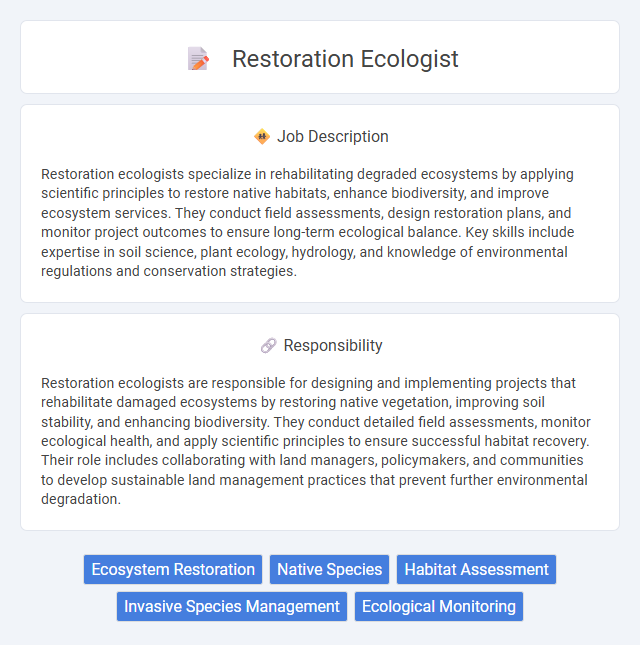
Restoration ecologists specialize in rehabilitating degraded ecosystems by applying scientific principles to restore native habitats, enhance biodiversity, and improve ecosystem services. They conduct field assessments, design restoration plans, and monitor project outcomes to ensure long-term ecological balance. Key skills include expertise in soil science, plant ecology, hydrology, and knowledge of environmental regulations and conservation strategies.
Individuals with a strong passion for environmental conservation and a background in ecology or environmental science are likely suitable for a Restoration Ecologist role, as it requires practical knowledge of ecosystem restoration and sustainable practices. Those who thrive in outdoor work environments and can handle physically demanding tasks may find this job more fitting, given the hands-on nature of site assessments and habitat rehabilitation. Conversely, people less interested in fieldwork or lacking patience for long-term project development might face challenges adapting to this career.
Qualification
Restoration Ecologists typically require a bachelor's degree in ecology, environmental science, or related fields, with many positions preferring a master's degree or higher for advanced project leadership. Proficiency in ecological assessment, habitat restoration techniques, GIS mapping, and species identification is crucial, alongside strong data analysis and report-writing skills. Experience working on restoration projects in various ecosystems and knowledge of local environmental regulations significantly enhance job qualifications.
Responsibility
Restoration ecologists are responsible for designing and implementing projects that rehabilitate damaged ecosystems by restoring native vegetation, improving soil stability, and enhancing biodiversity. They conduct detailed field assessments, monitor ecological health, and apply scientific principles to ensure successful habitat recovery. Their role includes collaborating with land managers, policymakers, and communities to develop sustainable land management practices that prevent further environmental degradation.
Benefit
Restoration ecologists likely contribute significantly to ecosystem health by rehabilitating degraded landscapes, which may enhance biodiversity and improve ecosystem services. Their work could increase habitat connectivity, supporting wildlife populations and resilience to climate change. Engaging in this profession might offer opportunities for impactful environmental stewardship and collaboration with diverse stakeholders.
Challenge
The role of a Restoration Ecologist likely involves overcoming complex environmental challenges such as habitat degradation, invasive species management, and climate change impacts. Success probably depends on developing innovative, science-based strategies that balance ecological, social, and economic factors. The position may frequently require adaptability and problem-solving skills to address unpredictable restoration obstacles in diverse ecosystems.
Career Advancement
Restoration ecologists focus on rehabilitating damaged ecosystems, utilizing expertise in native plant species, soil science, and habitat restoration techniques to advance environmental sustainability. Career advancement opportunities include roles such as Senior Restoration Ecologist, Project Manager, or Environmental Consultant, often requiring specialized certifications and advanced degrees in ecology or environmental science. Strong skills in data analysis, project management, and regulatory compliance enhance prospects for leadership positions and influence in environmental policy and conservation planning.
Key Terms
Ecosystem Restoration
Restoration ecologists specialize in ecosystem restoration by assessing degraded habitats, developing strategic plans, and implementing techniques to revive native biodiversity and ecological functions. They utilize methods such as reforestation, invasive species management, and soil remediation to restore natural processes and enhance habitat resilience. Their work supports biodiversity conservation, improves water quality, and contributes to climate change mitigation through carbon sequestration.
Native Species
Restoration ecologists specialize in reviving ecosystems by reestablishing native species to restore biodiversity and ecosystem functions. They conduct field assessments, develop restoration plans, and monitor native plant and animal populations to ensure ecosystem resilience. Expertise in native species propagation and habitat requirements is critical for successful ecological restoration projects.
Habitat Assessment
Restoration ecologists specializing in habitat assessment analyze ecosystems to evaluate environmental health and identify areas requiring rehabilitation. They use field surveys, GIS mapping, and ecological indicators to determine habitat quality and biodiversity status. Their assessments guide the development of restoration plans aimed at enhancing ecosystem function and resilience.
Invasive Species Management
Restoration ecologists specializing in invasive species management develop and implement strategies to control and eradicate non-native plants and animals that disrupt native ecosystems. They conduct field assessments to identify invasive species populations and monitor the effectiveness of removal techniques, such as mechanical, chemical, or biological control methods. Expertise in ecological restoration principles and knowledge of local biodiversity are essential for restoring habitat balance and promoting native species recovery.
Ecological Monitoring
Restoration ecologists specializing in ecological monitoring conduct systematic assessments of ecosystems to evaluate restoration success and track biodiversity recovery. They use remote sensing technology, GIS mapping, and field surveys to gather data on soil health, vegetation cover, and wildlife populations. Their analysis informs adaptive management strategies and ensures compliance with environmental regulations.
 kuljobs.com
kuljobs.com